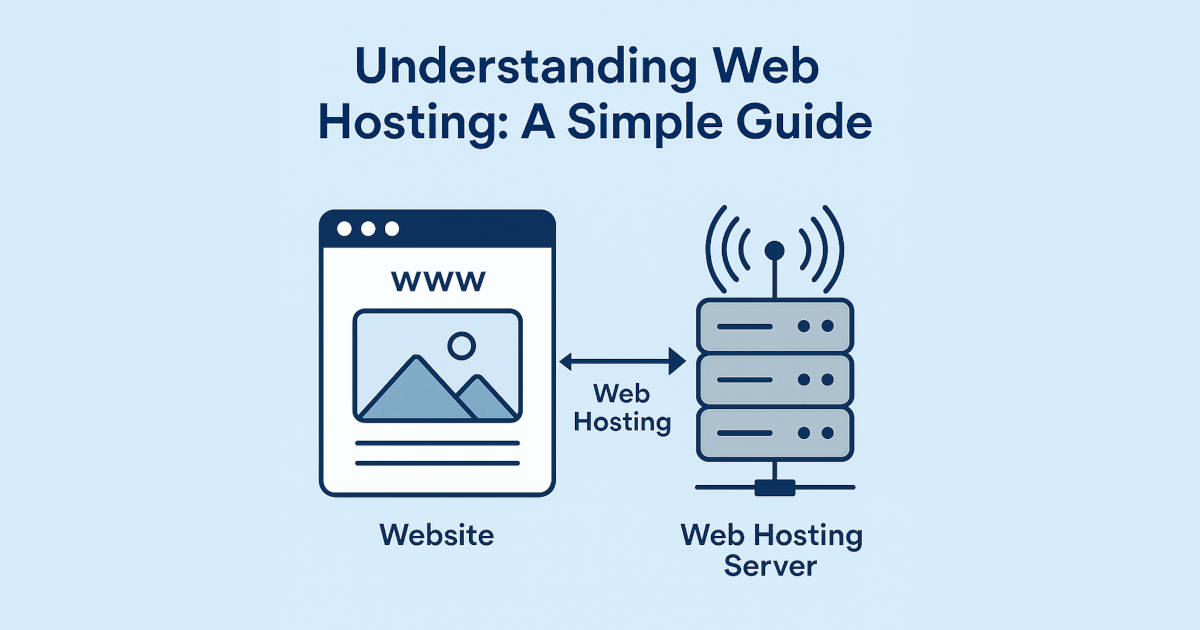When you're setting up a website for the first time, you'll likely come across the term web hosting. It may sound technical, but web hosting is actually a simple and essential concept in getting your website online. In this guide, we'll break down what web hosting is, why it's important, and how it works—without all the jargon.
Think of your website as a house. Every house needs a plot of land to sit on. In the online world, that "land" is called web hosting. It's a service that stores your website's files—like images, text, and code—and makes them available to anyone who wants to visit your site.
In more technical terms, web hosting is the process of renting space on a server, which is a powerful computer that’s always connected to the internet. When someone types your domain name (like www.mywebsite.com) into their browser, that server delivers your website’s content to their screen.
Without web hosting, your website simply wouldn’t exist online. It's as critical to a website as fuel is to a car. Here’s why web hosting matters:
There are a few main types of hosting, each suited to different needs:
When picking a web host, think about your website’s needs. Ask yourself:
Web hosting may seem complex at first, but it's really just about giving your website a home on the internet. With the right hosting plan, your site will be secure, fast, and always available to your visitors. Whether you're starting a blog, launching a business, or building a portfolio, understanding the basics of web hosting is the first step to making your online presence a reality.
What Is Web Hosting?
Think of your website as a house. Every house needs a plot of land to sit on. In the online world, that "land" is called web hosting. It's a service that stores your website's files—like images, text, and code—and makes them available to anyone who wants to visit your site.
In more technical terms, web hosting is the process of renting space on a server, which is a powerful computer that’s always connected to the internet. When someone types your domain name (like www.mywebsite.com) into their browser, that server delivers your website’s content to their screen.
Why Is Web Hosting Important?
Without web hosting, your website simply wouldn’t exist online. It's as critical to a website as fuel is to a car. Here’s why web hosting matters:
- Accessibility: A hosting server ensures your site is available 24/7 so people can visit it any time, from anywhere.
- Speed: Good web hosting helps your site load quickly, which keeps visitors happy and improves your SEO (search engine optimization).
- Security: Many web hosting providers offer security features like firewalls, backups, and protection from hackers.
- Scalability: As your website grows, a quality hosting plan can scale with it—handling more traffic and storing more content.
Types of Web Hosting (In Simple Terms)
There are a few main types of hosting, each suited to different needs:
- Shared Hosting: Like renting an apartment—you share a server with other websites. It’s affordable and great for beginners.
- VPS (Virtual Private Server): A middle ground where you get more control and resources than shared hosting, but still share the physical server.
- Dedicated Hosting: Like owning your own house—you get a whole server to yourself. It’s powerful but more expensive.
- Cloud Hosting: Your site lives on multiple servers. It’s flexible and reliable, often used for growing businesses.
- Managed Hosting: The hosting company handles all the technical stuff for you—updates, security, backups, etc.
Choosing the Right Web Hosting
When picking a web host, think about your website’s needs. Ask yourself:
- How much traffic do I expect?
- Do I need help with technical maintenance?
- What’s my budget?
- Do I want email hosting included?
- Will I be adding e-commerce features?
Final Thoughts
Web hosting may seem complex at first, but it's really just about giving your website a home on the internet. With the right hosting plan, your site will be secure, fast, and always available to your visitors. Whether you're starting a blog, launching a business, or building a portfolio, understanding the basics of web hosting is the first step to making your online presence a reality.

